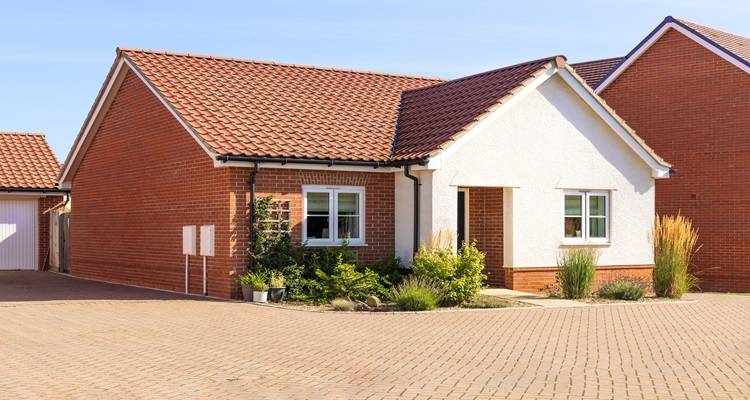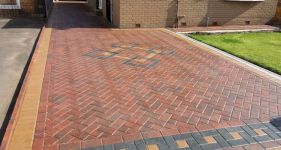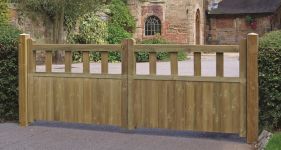Concrete Driveway Guide
Are you looking for information about concrete driveways?
We have created this guide with everything you need to know about concrete driveways, including the cost of installing a concrete driveway, the different types of concrete driveway, how to install a concrete driveway and the best ways to clean and maintain your concrete driveway.

Table of Contents
- What is a Concrete Driveway?
- Types of Concrete Driveways
- Concrete Driveway Ideas
- What Are the Pros and Cons of a Concrete Driveway?
- How Much Does a Concrete Driveway Cost?
- How to Install a Concrete Driveway
- How Long Does It Take to Install Concrete on a Driveway?
- Building Regulations & Planning Permission for a Concrete Driveway
- How to Clean and Maintain a Concrete Driveway
- Alternatives to a Concrete Driveway
- Questions to Ask When Hiring a Concrete Driveway Installer
- FAQs
What is a Concrete Driveway?
A concrete driveway is a very popular type of driveway in the UK and beyond. This is because concrete is extremely strong and durable and so makes the perfect driveway building material.

Concrete driveways tend to last for a very long time and require little maintenance, so they're seen as a very good investment.
Types of Concrete Driveways
There are several different types of concrete that work well as a driveway material. The type you choose will depend on your particular taste, budget, and how you intend to use your driveway.
Below is a list of the different types of driveway concrete and the pros and cons of each type:
Plain or Coloured Concrete Driveways
Many homeowners choose plain or coloured concrete because it is simple, sleek and looks great. This means that it's suitable for pretty much any home. This type of concrete is also durable, long-lasting, and can be poured over most properly prepared surfaces.

If you're not a fan of the classic grey concrete colour, you can opt for a coloured concrete option that provides the same simplicity with a bit of personality to match the aesthetic of your home.
Pros
- ✔ Simple.
- ✔ Aesthetically pleasing.
- ✔ Range of colours available.
- ✔ Easy to install.
- ✔ Easy to maintain.
- ✔ Durable.
- ✔ Long-lasting.
Cons
- ✖ Some may see it as boring.
Slate Concrete Driveways
A slate concrete driveway is created by stamping slate-textured mats onto ready-mixed concrete. This is usually done just before the setting stage. The result of this creates a look that is very similar to slate or stone but requires much less work than a proper slate or stone driveway.

The slate concrete can also be sealed to create a glossy finish that looks absolutely luxurious. There is a wide range of colours and patterns available for this type of concrete driveway, so you'll easily be able to find something that suits your property.
Pros
- ✔ Sophisticated look.
- ✔ Wide range of colours.
- ✔ Wide range of patterns.
- ✔ Aesthetically pleasing.
- ✔ Easier to install than the real thing.
Cons
- ✖ May require more maintenance.
- ✖ More difficult to install than other concrete types.
Stencilled Concrete Driveways
Stencilled concrete allows you to achieve a look similar to a tiled or paved driveway but without the need for bricks, tiles, pavers, or stones. Instead, the method involves stencilling on the desired design just before the concrete hardens fully.

If you are looking for something unique, distinctive, and sophisticated, this is a great option. There are many stencilling options available, so you'll easily be able to find something to suit your taste.
Pros
- ✔ Unique designs.
- ✔ Achieve tiled or paved appearance without the materials.
- ✔ Many patterns.
- ✔ Lovely aesthetic.
Cons
- ✖ Difficult to install without the right equipment.
- ✖ May require additional maintenance.
Exposed Aggregate Concrete Driveways
This type of concrete is becoming an increasingly popular option. It is attractive in appearance and provides a durable surface that is very stylish and versatile. There are so many different colours and textures to choose from.

The process involves mixing concrete with aggregates such as sand and stone and then pouring this mixture onto the surface. It produces a gorgeous textured look that looks great in front of most homes.
Pros
- ✔ Beautiful aesthetic.
- ✔ Unique design.
- ✔ Versatile.
- ✔ Durable.
Cons
- ✖ Difficult to install.
- ✖ Not to everyone's taste.
- ✖ Requires maintenance.
- ✖ Stones can become loose or break away over time.
Concrete Driveway Ideas
Concrete is a great material for driveways as it is very versatile, and there are so many different things that you can do with it to achieve your dream driveway.
Below is a list of concrete driveway ideas to give you a little bit of inspiration for your own driveway:
Coloured Concrete Driveway Ideas
- Contemporary Colours — Modern shades like charcoal grey and warm beige are very popular for contemporary homes, as they create a sleek look that really complements modern architecture.
- Traditional Colours — Natural grey and earthy tones, such as sandy beige or brown, work brilliantly with traditional properties.
- Contrasting Borders — You can create visual interest by using a different colour for your driveway border. A darker border around a lighter driveway creates definition and makes the space look more intentional and well-designed.
Concrete Driveway Design Ideas
Pattern and Textures

- Slate Stamped Design — A slate-stamped concrete driveway design is very eye-catching and looks great, especially on modern houses. The grey/charcoal slate colour complements the house, and the slate design really emphasises the space, often making the driveway appear bigger than it actually is.
- Cobbled Design — Cobbled driveways are very popular, and you can achieve the cobbled look by stencilling concrete. This design is best suited for smaller driveways as it can make the area look quite busy, but it looks great in front of period homes and can really complement the older aesthetic.
- European Fan Design — The European fan design offers a unique look that stands out. If you're looking for a driveway that is very eye-catching and offers a unique appearance, then this is probably the one for you.
Driveway Borders
- Block Paving — Block paving borders are a great way to frame your concrete driveway. Using a contrasting colour or material creates a clear edge and adds a decorative finish.
- Natural Stone — Natural stone or cobblestone edging adds a high-quality, traditional finish to your driveway. Borders like cobblestones work well with period properties and countryside homes.
- Planted Borders — Planting flower beds or shrubs adds colour and a natural border to your driveway, while softening the hard edges. Choose hardy plants that suit the UK climate for a border that looks good all year round.
Practical Concrete Driveway Ideas
- Driveway Lighting — Installing outdoor lighting along your driveway improves visibility and safety during darker months, particularly if you have a curved or sloped driveway.
- Non-Slip Finish — A brushed or broom finish creates texture on your concrete surface, making it safer to drive on in wet weather.
- Drainage — Make sure your new concrete driveway includes drainage solutions that meet building regulations requirements, especially for front driveways.
What Are the Pros and Cons of a Concrete Driveway?
There are several pros and cons to choosing a concrete driveway over another style of driveway. Below is a list of the main advantages and disadvantages of choosing a concrete driveway:
Pros
Affordable Option
A concrete driveway is an affordable option and a good investment. You will most likely only need to have your driveway done once in the entire time that you own your home.
Very Durable
Concrete is an extremely durable surface. A well-installed concrete driveway can last for several decades if properly maintained.
Very Strong
If installed correctly, a concrete driveway can withstand a lot of weight. This is perfect if you are planning on parking heavy vehicles on the driveway.
Cons
Less Attractive Than Other Options
Concrete is not the most attractive building material, and there are plenty of other driveway material options that are more attractive. However, you can get coloured concrete or decorative concrete, but these may require more maintenance than plain concrete.
Requires Maintenance
Your concrete driveway will need to be maintained regularly. It's a good idea to seal your driveway every few years to ensure it lasts a long time. Oils and other fluids from your vehicles can also easily cause stains on concrete.
Not Great for DIY
Concrete is not a great option if you are looking to build a DIY driveway, especially if it's a large project. Pouring a concrete driveway is quite a difficult task that requires experience and hard labour. With this in mind, it's best to leave concrete driveway installations to the professionals.
How Much Does a Concrete Driveway Cost?

It can be difficult to determine exactly how much your new concrete driveway is going to cost. It depends on many factors, including your location, the size of the area, and the type of concrete driveway that you are planning on installing.
There are also some additional jobs that you may wish to consider alongside your concrete driveway installation, such as a new driveway gate or brick wall installation to close off your driveway.
How to Install a Concrete Driveway
Installing a concrete driveway requires hard labour. It can be difficult to create the desired look without the necessary skills or experience. Plus, you need to ensure there is adequate drainage to adhere to the rules around drainage and planning permission.
Because of this, most homeowners prefer to hire a professional to install their concrete driveway. You can request several quotes from local driveway pavers, using MyJobQuote, that are fast, free, and with no obligation to go ahead.
Below is a brief outline of the steps that are involved when building a concrete driveway:
Before the Job Starts
- Lay Out the Perimeter — Use wooden stakes to lay out the perimeter of the new driveway.
- Create Temporary Housing — Use sturdy wooden planks to create solid temporary housing for the new driveway.
- Dig Out and Level — Dig out the topsoil and level out the sub-base.
- Add Reinforcement — If needed, add steel rebars to reinforce the driveway.
During the Job
- Pour the Concrete — Once the above steps are complete, you can then start pouring the concrete into the area.
- Distribute Evenly — Use a hoe as you're pouring to keep the concrete evenly distributed and relatively flat.
- Flatten the Area — Once all of the concrete has been poured, flatten the area using straight timber. Remove any excess as you go along and use this to fill in any shallow areas.
- Cut Contraction Joints — Use a grooving tool to cut in some contraction joints.
- Create Non-Slip Finish — Use a broom to create a non-slip finish on the surface.
After the Job
- Water Cure the Driveway — Water cure the driveway for around 7-10 days after the installation.
- Remove Temporary Housing — Remove the temporary housing once you start curing the driveway.
- Edge the Concrete — Edge the concrete if necessary.
- Wait Before Use — Wait around 28 days for the driveway to completely cure before driving or parking your vehicle on it.
How Long Does It Take to Install Concrete on a Driveway?
The time it takes to install a concrete driveway will usually depend a lot on how large the new driveway is and the type of concrete driveway installed.

A small, basic concrete driveway that fits one car will usually take as little as two days to complete. A larger driveway with a more extravagant design could take one to two weeks to complete.
When you contact professionals to arrange the installation of your new driveway, they will usually be able to provide you with some more accurate timescales based on the size and design of your particular driveway.
Building Regulations & Planning Permission for a Concrete Driveway
When it comes to a concrete driveway, you won't usually need to worry about planning permission. The rules state that any new or replacement driveway usually does not need planning permission as long as the surface has adequate drainage, especially for front driveways.
Your concrete driveway contractors will have the knowledge and skills needed to provide appropriate drainage. Some concrete types are porous and so won't need additional drainage measures in place.

If your property is a listed building or is in a conservation area, then you may need consent to make any changes to your home. It is advised that you contact your local authority before commencing with any work.
Building regulations don't generally apply to driveway work. However, you will need to make sure that your new driveway doesn't affect access to your property.
If you are unsure whether your new driveway or any alterations may need building regulations approval, then you should contact your local authority for advice before any work takes place.
How to Clean and Maintain a Concrete Driveway
Although it won't need much maintenance, there are some things that you can do to keep your concrete driveway in top shape. Below is a list of tips on how to maintain and clean your driveway:
Clean The Driveway
As you start to use your driveway on a daily basis, it will start to collect dirt and debris. This can affect the driveway's appearance, so it's a good idea to keep on top of cleaning it.
The best way to clean your driveway is to start by brushing away all surface dirt and debris. Then, use a power washer to clean up the embedded dirt.
You may notice that moss starts to grow over time which you will need to remove during the cleaning process. This will usually come up easily with the power washer.
However, some more stubborn parts may need to be ripped up by hand. If you notice any oil or grease stains, you should clean these up immediately as they will cause discolouration.
Avoid De-Icing
During the winter months, the weather will start to get cold, and ice may form on the driveway's surface. You will usually have to remove the ice from your driveway so that it remains in a useable condition.
However, you should always avoid using harsh de-icing chemicals as they can cause scaling and spalling. De-icing chemicals can also cause further damage to the driveway if they manage to make their way into any existing small cracks. Instead of using these products, you should use an alternative such as sand to remove the ice.
Re-seal Regularly
When your new driveway is constructed, a sealant will be used. Over time, this sealant will wear off, and your driveway will need to be sealed again to keep it clean and protected. Your driveway installation contractors will be able to give you an idea of how often you will need to re-seal your driveway.
The timeframes are different depending on the type of concrete used and the design of your driveway. They will also be able to recommend the best type of sealant for your particular driveway.
Don't Overload
Concrete is extremely durable and can usually withstand a lot of weight. However, you need to ensure that you don't overload your driveway as it may become damaged. Avoid parking loaded vehicles or heavy machinery on the driveway.
Repair Cracks Quickly
It's common for cracks to appear in a concrete driveway over some time. As time goes on, these cracks can become bigger and cause more damage if not rectified quickly. You should aim to fill cracks in as soon as you notice them to prevent the possibility of further damage.
If left for long enough, cracks can widen to the point where the driveway can no longer be used, so it's extremely important to keep on top of concrete driveway repairs when needed.
Alternatives to a Concrete Driveway
Concrete driveways are extremely popular, however, they're not for everyone. If you are planning on having a new driveway installed and you've decided concrete isn't for you, you may be interested in the available alternatives.
The list below highlights the most common alternatives to a concrete driveway:
Block Paving Driveway
Block paving is a very popular type of driveway for UK homes. With such a huge range of different blocks and colours to choose from, it's easy to find a block paving driveway that will suit the aesthetic of your home.
The paving blocks can be arranged in many different styles, so you can create a unique driveway with an attractive finish.
Resin Driveway
Resin driveways are becoming increasingly popular over the years. This type of driveway offers a very aesthetically pleasing finish that is suitable for almost any home. It is also relatively quick and easy to install, remains durable, and doesn't require much maintenance.

Gravel Driveway
A gravel driveway is a great option for many homes. The materials are very budget-friendly, and the driveway itself is cheap and easy to install. The stones for a gravel driveway come in several different styles, colours, and sizes, making it very easy to find a type of stone that will compliment your home well.
Asphalt Driveway
Asphalt is another popular type of driveway in the UK. It offers an aesthetically pleasing appearance and is also very durable and lasts for a very long time. Although it can be quite expensive to install, it's guaranteed to last many years, making it a great investment.
Questions to Ask When Hiring a Concrete Driveway Installer
You may need to consider several things when finding the right contractor to install a concrete driveway at your home. Below is a list of common questions that you should ask when looking for the right contractor for the job:
- Does the contractor have any qualifications that relate directly to installing a concrete driveway?
- What equipment will the contractor be using to complete the job? Will they be using the correct type of equipment? Do you need to provide any equipment?
- Does the contractor possess any form of insurance for the work? You should look for contractors who have insurance covering property damage, personal injuries, and a work guarantee.
- How much experience does the contractor have in concrete driveway installation? Can they provide any testimonials or evidence of previous work? Can they provide photos of previous work?
- Does the contractor offer any guarantees with their work? How long does the guarantee last? What issues are covered under the guarantee? Will the contractor fix any issues that arise?
- Is the contractor able to produce the concrete driveway design that you desire? You may wish to ask for evidence that they can create the appearance that you're looking for.
- How long will the work take to complete?
- How many contractors will be working on the job?
- Is there anything you need to do to prepare for the installation?
FAQs
Can You Fix a Crumbling Concrete Driveway?
- Brush the concrete surface and remove all of the dirt, debris, and weeds.
- Pressure wash the area to remove as much ingrained debris and dirt as possible.
- Mask the area around the damage where you don't want the new concrete to touch.
- Mix your new concrete to the appropriate consistency.
- Spread a layer of bonding agent over the surface and then trowel the concrete over the surface evenly.
- Use the edge of the trowel to create a smooth surface.
- Add a second coat of concrete before the first layer has dried. This should be a wetter mix than the first layer.
- Use a concrete smoothing broom to drag the second layer across the entire surface.
How Do You Remove Oil Stains From a Concrete Driveway?
- You need to start by absorbent any excess oil that remains on the surface. Use an absorbent material such as cat litter and sprinkle it over the stain. Leave it to absorb the stain for a while and then scoop it away and dispose of it. Then, rinse the area with water to remove any remaining residue.
- Next, you'll need to scrub the stain. Create a paste of baking soda and water and scrub the area. Then, rinse it off with water.
- If any staining still remains after you've completed the previous steps, you should apply some dish soap to the area. Squirt some of the soap onto the stain, and then use a heavy-duty brush to scrub it. Repeat this process until the stain fades.
Can I Install a Concrete Driveway Myself?
How Long Do I Need to Wait Before Driving on My New Concrete Driveway?
If you drive on it before it has had time to set properly, then it may not be at its optimum strength, and your vehicle could cause some damage to the concrete.








